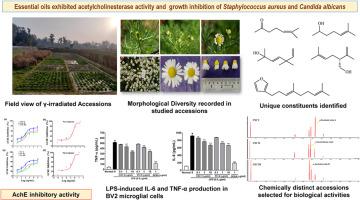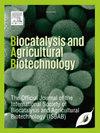γ-辐照德国洋甘菊(Matricaria recutita L.)花精油的化学成分、乙酰胆碱酯酶抑制活性以及对金黄色葡萄球菌和白色念珠菌生长的抑制作用
IF 3.4
Q2 BIOTECHNOLOGY & APPLIED MICROBIOLOGY
引用次数: 0
摘要
辐射诱导突变是培育突变品种最常用的技术。其主要目的是通过改变限制代谢物生产率的几个主要性状来提升现有的植物品种。由于对受保护植物品种和种质的规定越来越多,限制了它们的使用。诱导突变体在加强植物育种计划方面发挥了重要作用。药用植物和芳香植物在突变育种方面的探索还很少。CSIR-CIMAP 启动了一些高价值植物(如母菊)的突变育种计划。因此,我们可以培育出伽马射线诱导的稳定品种。母菊属植物因能生物合成多种具有生物活性的植物次生代谢产物而闻名于世,其传统和保健功效在《欧洲药典》(Ph. Eur)中也有记载。本研究对德国洋甘菊(Matricaria recutita L.)经伽马射线辐照后的稳定品种进行了精油成分和生物评估研究。经过为期两年的深入研究,我们发现有些品种的α-双羟基氧化物 B 的比例最高(24.3%-55.3%),而相当多的品种则显示出chamazulene(2.9%-5.8%)、α-双羟基氧化物 A(6.5%-38%)和α-双羟基氧化物 A(30.1%-55.3%)。少数品种还含有薰衣草醇,这是一种不规则的单萜类化合物,具有很高的香味价值。此外,还对这些经过伽马射线照射的品种的抗菌、消炎和乙酰胆碱酯酶(AChE)抑制特性进行了评估。G6-R5-5 和 G2-R1-6 对金黄色葡萄球菌有最大的抑制作用,而 G2-R1-1 则能抑制白僵菌的生长。此外,G2R1-3 的成分还能减少 AChE 和细胞系中的炎症。这些结果可能会为开发洋甘菊植物衍生消费品开辟道路。本文章由计算机程序翻译,如有差异,请以英文原文为准。

Chemical composition of γ-irradiated German chamomile (Matricaria recutita L.) flower essential oils, acetylcholinesterase inhibitory activity and effects on growth inhibition of Staphylococcus aureus and Candida albicans
Radiation-induced mutations have been the most commonly used technique for the development of mutant varieties. The primary aim has been to upgrade the existing plant varieties by varying a few major traits responsible for limiting metabolite productivity. The increasing regulations on protected plant varieties and germplasms have restricted their use. The induced mutants have played a vital role in strengthening the plant breeding program. The medicinal and aromatic plants have been poorly explored for mutation breeding. CSIR-CIMAP has initiated a mutation breeding program on some of the high-value plants, like Matricaria. As a result, we could develop gamma-rays-induced stable accessions. Genus Matricaria is well known for the biosynthesis of diverse bioactive plant secondary metabolites as well as for its traditional and healthcare benefits documented in Ph. Eur. In the present work, gamma-irradiated stable accessions of German chamomile, Matricaria recutita L., have been investigated for their essential oil composition and biological assessment. After a thorough investigation for a two-year cropping period, we have observed that some accessions contain the highest α-bisabolol oxide B proportions (24.3–55.3%), while quite a few showed chamazulene (2.9–5.8%), α-bisabolone oxide A (6.5–38%), and α-bisabolol oxide A (30.1–55.3%). A few accessions were marked by the presence of lavandulol, an irregular monoterpenoid of high fragrance value. The antibacterial, anti-inflammatory, and acetylcholinesterase (AChE) inhibitory properties of these gamma-irradiated accessions were also evaluated. The accessions G6-R5-5 and G2-R1-6 exhibited maximum inhibition against S. aureus whereas G2-R1-1 arrested the growth of C. albicans. Furthermore, G2R1-3 composition is responsible for reducing AChE and inflammation in cell lines. These results may open up ways to develop plant-derived consumer products from Matricaria recutita L.
求助全文
通过发布文献求助,成功后即可免费获取论文全文。
去求助
来源期刊

Biocatalysis and agricultural biotechnology
Agricultural and Biological Sciences-Agronomy and Crop Science
CiteScore
7.70
自引率
2.50%
发文量
308
审稿时长
48 days
期刊介绍:
Biocatalysis and Agricultural Biotechnology is the official journal of the International Society of Biocatalysis and Agricultural Biotechnology (ISBAB). The journal publishes high quality articles especially in the science and technology of biocatalysis, bioprocesses, agricultural biotechnology, biomedical biotechnology, and, if appropriate, from other related areas of biotechnology. The journal will publish peer-reviewed basic and applied research papers, authoritative reviews, and feature articles. The scope of the journal encompasses the research, industrial, and commercial aspects of biotechnology, including the areas of: biocatalysis; bioprocesses; food and agriculture; genetic engineering; molecular biology; healthcare and pharmaceuticals; biofuels; genomics; nanotechnology; environment and biodiversity; and bioremediation.
 求助内容:
求助内容: 应助结果提醒方式:
应助结果提醒方式:


